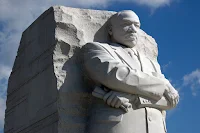For the controversy over the inscription on the MLK statue, see The Washington Post here:
“I was a drum major for justice, peace and righteousness,” the monument says. What an odd choice for a quote, I thought, when I visited in August before its scheduled dedication. It sounded almost . . . conceited. And it was past tense, as though King was speaking from the grave. It didn’t sound like King at all.
I went looking for the context, read the whole speech and found there was a reason it didn’t sound like him. “If you want to say I was a drum major, say I was . . . ” is how King began his statement. As many have since pointed out, the “if” and the “you” entirely change the meaning. To King, being a self-aggrandizing drum major was not a good thing; if you wanted to call him that, he said, at least say it was in the service of good causes.
Why such concern over an inaccurate inscription on a monument to a plagiarist? Wouldn't it be more fitting to leave it as it is?
From the Wikipedia entry here:
King's doctoral dissertation at Boston University, titled A Comparison of the Conception of God in the Thinking of Paul Tillich and Henry Nelson Wieman, included large sections from a dissertation written by another student (Jack Boozer) three years earlier at Boston University.
As Clayborne Carson, director of the King Papers Project at Stanford University, has written, "instances of textual appropriation can be seen in his earliest extant writings as well as his dissertation. The pattern is also noticeable in his speeches and sermons throughout his career."
Boston University, where King got his Ph.D. in systematic theology, conducted an investigation that found he plagiarized major portions of his doctoral thesis from various other authors who wrote about the topic.
